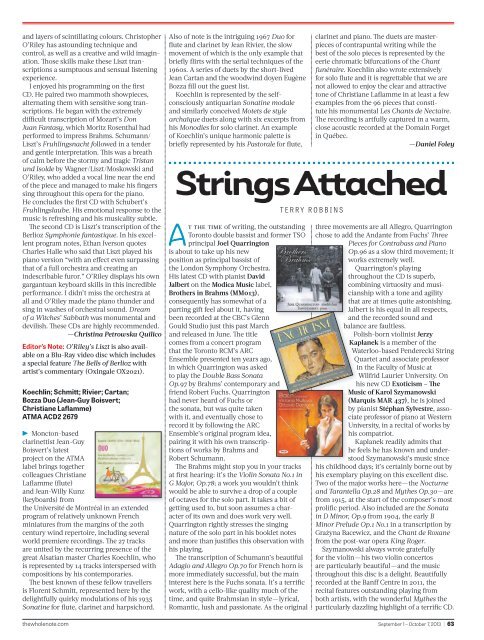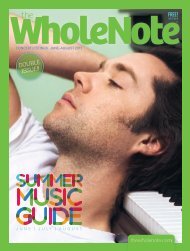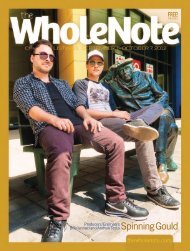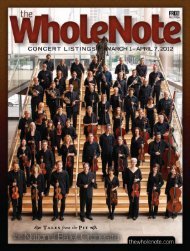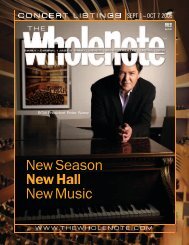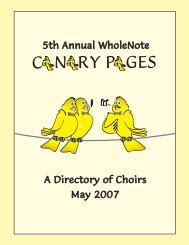PDF version - The Wholenote Magazine
PDF version - The Wholenote Magazine
PDF version - The Wholenote Magazine
Create successful ePaper yourself
Turn your PDF publications into a flip-book with our unique Google optimized e-Paper software.
and layers of scintillating colours. ChristopherO’Riley has astounding technique andcontrol, as well as a creative and wild imagination.Those skills make these Liszt transcriptionsa sumptuous and sensual listeningexperience.I enjoyed his programming on the firstCD. He paired two mammoth showpieces,alternating them with sensitive song transcriptions.He began with the extremelydifficult transcription of Mozart’s DonJuan Fantasy, which Moritz Rosenthal hadperformed to impress Brahms. Schumann/Liszt’s Fruhlingsnacht followed in a tenderand gentle interpretation. This was a breathof calm before the stormy and tragic Tristanund Isolde by Wagner/Liszt/Moskowski andO’Riley, who added a vocal line near the endof the piece and managed to make his fingerssing throughout this opera for the piano.He concludes the first CD with Schubert’sFruhlingslaube. His emotional response to themusic is refreshing and his musicality subtle.<strong>The</strong> second CD is Liszt’s transcription of theBerlioz Symphonie fantastique. In his excellentprogram notes, Ethan Iverson quotesCharles Halle who said that Liszt played hispiano <strong>version</strong> “with an effect even surpassingthat of a full orchestra and creating anindescribable furor.” O’Riley displays his owngargantuan keyboard skills in this incredibleperformance. I didn’t miss the orchestra atall and O’Riley made the piano thunder andsing in washes of orchestral sound. Dreamof a Witches’ Sabbath was monumental anddevilish. <strong>The</strong>se CDs are highly recommended.—Christina Petrowska QuilicoEditor’s Note: O’Riley’s Liszt is also availableon a Blu-Ray video disc which includesa special feature <strong>The</strong> Bells of Berlioz withartist’s commentary (Oxingale OX2021).Koechlin; Schmitt; Rivier; Cartan;Bozza Duo (Jean-Guy Boisvert;Christiane Laflamme)ATMA ACD2 2679!!Moncton-basedclarinettist Jean-GuyBoisvert’s latestproject on the ATMAlabel brings togethercolleagues ChristianeLaflamme (flute)and Jean-Willy Kunz(keyboards) fromthe Université de Montréal in an extendedprogram of relatively unknown Frenchminiatures from the margins of the 20thcentury wind repertoire, including severalworld premiere recordings. <strong>The</strong> 27 tracksare united by the recurring presence of thegreat Alsatian master Charles Koechlin, whois represented by 14 tracks interspersed withcompositions by his contemporaries.<strong>The</strong> best known of these fellow travellersis Florent Schmitt, represented here by thedelightfully quirky modulations of his 1935Sonatine for flute, clarinet and harpsichord.Also of note is the intriguing 1967 Duo forflute and clarinet by Jean Rivier, the slowmovement of which is the only example thatbriefly flirts with the serial techniques of the1960s. A series of duets by the short-livedJean Cartan and the woodwind doyen EugèneBozza fill out the guest list.Koechlin is represented by the selfconsciouslyantiquarian Sonatine modaleand similarly conceived Motets de stylearchaïque duets along with six excerpts fromhis Monodies for solo clarinet. An exampleof Koechlin’s unique harmonic palette isbriefly represented by his Pastorale for flute,At the time of writing, the outstandingToronto double bassist and former TSOprincipal Joel Quarringtonis about to take up his newposition as principal bassist ofthe London Symphony Orchestra.His latest CD with pianist DavidJalbert on the Modica Music label,Brothers in Brahms (MM013),consequently has somewhat of aparting gift feel about it, havingbeen recorded at the CBC’s GlennGould Studio just this past Marchand released in June. <strong>The</strong> titlecomes from a concert programthat the Toronto RCM’s ARCEnsemble presented ten years ago,in which Quarrington was askedto play the Double Bass SonataOp.97 by Brahms’ contemporary andfriend Robert Fuchs. Quarringtonhad never heard of Fuchs orthe sonata, but was quite takenwith it, and eventually chose torecord it by following the ARCEnsemble’s original program idea,pairing it with his own transcriptionsof works by Brahms andRobert Schumann.<strong>The</strong> Brahms might stop you in your tracksat first hearing: it’s the Violin Sonata No.1 inG Major, Op.78; a work you wouldn’t thinkwould be able to survive a drop of a coupleof octaves for the solo part. It takes a bit ofgetting used to, but soon assumes a characterof its own and does work very well.Quarrington rightly stresses the singingnature of the solo part in his booklet notesand more than justifies this observation withhis playing.<strong>The</strong> transcription of Schumann’s beautifulAdagio and Allegro Op.70 for French horn ismore immediately successful, but the maininterest here is the Fuchs sonata. It’s a terrificwork, with a cello-like quality much of thetime, and quite Brahmsian in style — lyrical,Romantic, lush and passionate. As the originalTERRY ROBBINSclarinet and piano. <strong>The</strong> duets are masterpiecesof contrapuntal writing while thebest of the solo pieces is represented by theeerie chromatic bifurcations of the Chantfunéraire. Koechlin also wrote extensivelyfor solo flute and it is regrettable that we arenot allowed to enjoy the clear and attractivetone of Christiane Laflamme in at least a fewexamples from the 96 pieces that constitutehis monumental Les Chants de Nectaire.<strong>The</strong> recording is artfully captured in a warm,close acoustic recorded at the Domain Forgetin Québec.—Daniel Foleythree movements are all Allegro, Quarringtonchose to add the Andante from Fuchs’ ThreePieces for Contrabass and PianoOp.96 as a slow third movement; itworks extremely well.Quarrington’s playingthroughout the CD is superb,combining virtuosity and musicianshipwith a tone and agilitythat are at times quite astonishing.Jalbert is his equal in all respects,and the recorded sound andbalance are faultless.Polish-born violinist JerzyKaplanek is a member of theWaterloo-based Penderecki StringQuartet and associate professorin the Faculty of Music atWilfrid Laurier University. Onhis new CD Exoticism – <strong>The</strong>Music of Karol Szymanowski(Marquis MAR 437), he is joinedby pianist Stéphan Sylvestre, associateprofessor of piano at WesternUniversity, in a recital of works byhis compatriot.Kaplanek readily admits thathe feels he has known and understoodSzymanowski’s music sincehis childhood days; it’s certainly borne out byhis exemplary playing on this excellent disc.Two of the major works here — the Nocturneand Tarantella Op.28 and Mythes Op.30 — arefrom 1915, at the start of the composer’s mostprolific period. Also included are the Sonatain D Minor, Op.9 from 1904, the early BMinor Prelude Op.1 No.1 in a transcription byGrażyna Bacewicz, and the Chant de Roxanefrom the post-war opera King Roger.Szymanowski always wrote gratefullyfor the violin — his two violin concertosare particularly beautiful — and the musicthroughout this disc is a delight. Beautifullyrecorded at the Banff Centre in 2011, therecital features outstanding playing fromboth artists, with the wonderful Mythes theparticularly dazzling highlight of a terrific CD.thewholenote.com September 1 – October 7, 2013 | 63


